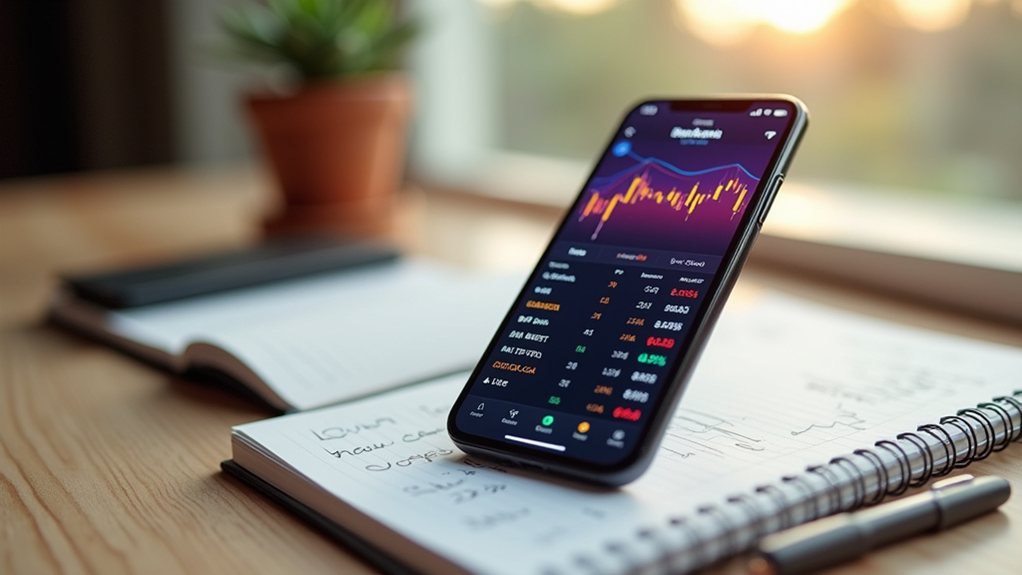Forex and crypto present five stark contrasts. Market structure: forex is regulated and institutional, crypto is decentralized. Trading hours: crypto never sleeps, forex takes weekends off. Volatility: forex shows predictable ripples, crypto can rocket or crash on a tweet. Liquidity: $6 trillion daily forex volume dwarfs crypto markets. Regulation: forex has strict oversight, crypto exists in a wild west environment. These differences determine which traders survive and which get eaten alive.
While traditional forex trading has dominated the financial landscape for decades, cryptocurrency has burst onto the scene as its rebellious, unpredictable cousin. These two financial worlds couldn't be more different if they tried. Forex operates in a structured, regulated environment where fiat currencies like USD, EUR, and JPY exchange hands through established financial institutions. It's the boring, reliable uncle at the family reunion.
Crypto? It's the wild child with over 11,000 digital currencies bouncing around on decentralized platforms, verified by blockchain technology instead of suits in banking towers.
Time never stops in crypto. Markets run 24/7, rain or shine, Christmas or Tuesday. Forex takes weekends off like a normal person—operating 24 hours but only five days a week. Some traders love crypto's relentless schedule; others appreciate forex's built-in recovery periods. The nonstop nature of crypto contributes to its notorious volatility. No breaks, no chill.
Speaking of volatility—forex traders deal with predictable ripples while crypto enthusiasts ride tsunamis. Currency pairs move within relatively narrow bands, influenced by economic reports and central bank decisions. Boring, right? Cryptocurrency prices, meanwhile, can skyrocket or crash based on a celebrity tweet or regulatory rumor. Higher risk, higher reward. Or spectacular failure. Take your pick. In crypto markets, this extreme volatility creates opportunities for considerable returns but requires proper risk management.
Liquidity makes a massive difference too. Forex is the heavyweight champion with over $6 trillion daily trading volume. That's trillion with a T. This liquidity means trades execute quickly with tight spreads—ideal for day traders who hate waiting.
Crypto markets are growing but still exhibit variable liquidity. Bitcoin and Ethereum offer decent liquidity, but try selling a large position in some random altcoin. Good luck with that.
The regulatory landscape might be the starkest contrast. Forex markets operate under strict oversight from agencies like the CFTC and FCA. Rules everywhere.
Crypto? It's basically the Wild West in many jurisdictions. Some countries embrace it, others ban it, most scratch their heads wondering what to do with it. This regulatory vacuum creates opportunities—and nightmares. Scams, hacks, and market manipulation happen regularly in crypto. Who you gonna call when your coins vanish? Exactly. Unlike traditional banking, crypto provides peer-to-peer transactions without intermediaries, offering more control but less protection.
Both markets offer distinct advantages and pitfalls. Forex provides stability, regulation, and predictability but limited hours and potentially lower returns. Many traders find that forex delivers more consistent profits with proper strategies despite smaller margins.
Crypto delivers innovation, 24/7 access, and explosive growth potential alongside heart-stopping volatility and regulatory uncertainty. Choose your poison. Or maybe try both. Just don't bet your house on either.
Frequently Asked Questions
Which Market Has Better Tax Advantages for Short-Term Traders?
For short-term traders, forex generally offers better tax advantages.
No wash sale rules apply, and Section 988 allows unlimited loss deductions against gains. Traders can even opt for the 60/40 rule under Section 1256 for a blended 23% rate on futures/options.
Crypto? Taxed as property with short-term gains hit at ordinary income rates up to 37%. Plus that pesky $3,000 annual capital loss limit.
Pretty clear winner here.
How Do Geopolitical Events Impact Forex Compared to Crypto?
Geopolitical events hit both markets, but differently.
Forex sees modest 1-2% swings with established safe havens like USD and JPY.
Crypto? Wild 10-20% rollercoaster rides.
Thank massive liquidity differences—$6.6 trillion daily in forex versus crypto's thinner markets.
When things get ugly, forex recovers faster. Central banks step in to stabilize currencies.
Crypto? You're on your own, buddy. No adult supervision when markets implode.
Can I Use the Same Technical Analysis Tools for Both Markets?
Technical analysis tools work for both markets, but with caveats.
Same indicators—RSI, MACD, Bollinger Bands—apply universally. The difference? Crypto's wild volatility makes these tools less reliable sometimes. False signals happen more often.
Platforms like TradingView and MetaTrader 4 handle both worlds fine. Crypto might need specialized blockchain analysis tools that forex doesn't.
Bottom line: the tools are the same, their effectiveness isn't.
Which Requires More Initial Capital to Start Trading Effectively?
Forex requires more capital, period.
Professional traders usually start with $1,000-$5,000 for decent risk management.
Crypto? You can jump in with spare change—literally $10 on some exchanges.
Sure, both markets recommend higher amounts for serious trading.
Forex has standardized lot sizes and stricter minimums.
Crypto lets you buy tiny fractions of coins.
Fascinating difference, really. More money always helps in both, though.
Are There Psychological Differences When Trading Forex Versus Crypto?
Trading psychology differs dramatically between forex and crypto.
Forex traders tend toward discipline and patience.
Crypto? Pure emotional rollercoaster.
Fear and greed hit different when prices swing 20% overnight.
FOMO drives crypto enthusiasts to throw caution (and savings) to the wind.
Crypto traders accept potential total loss.
They'll "HODL" through crashes that would give forex traders heart attacks.
Social media can tank or pump crypto instantly.
Economics? That's forex's territory.








